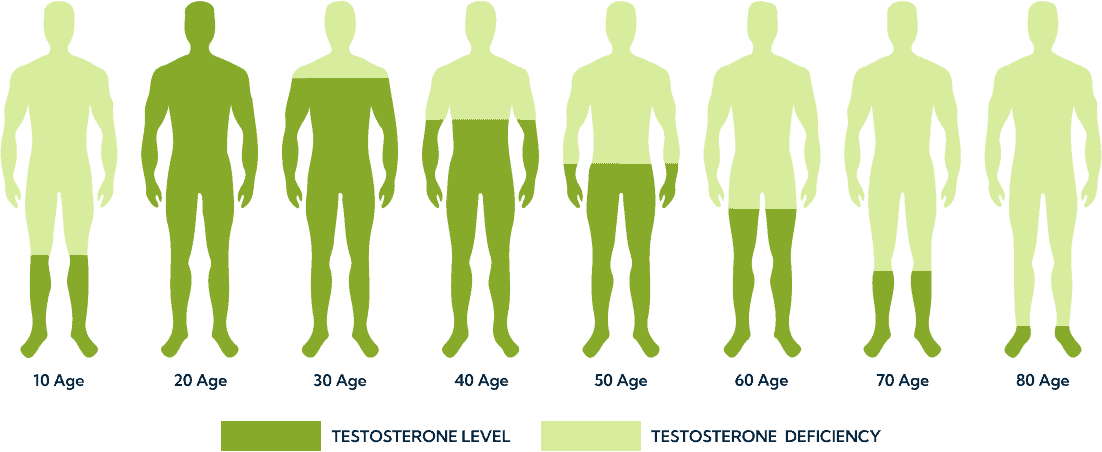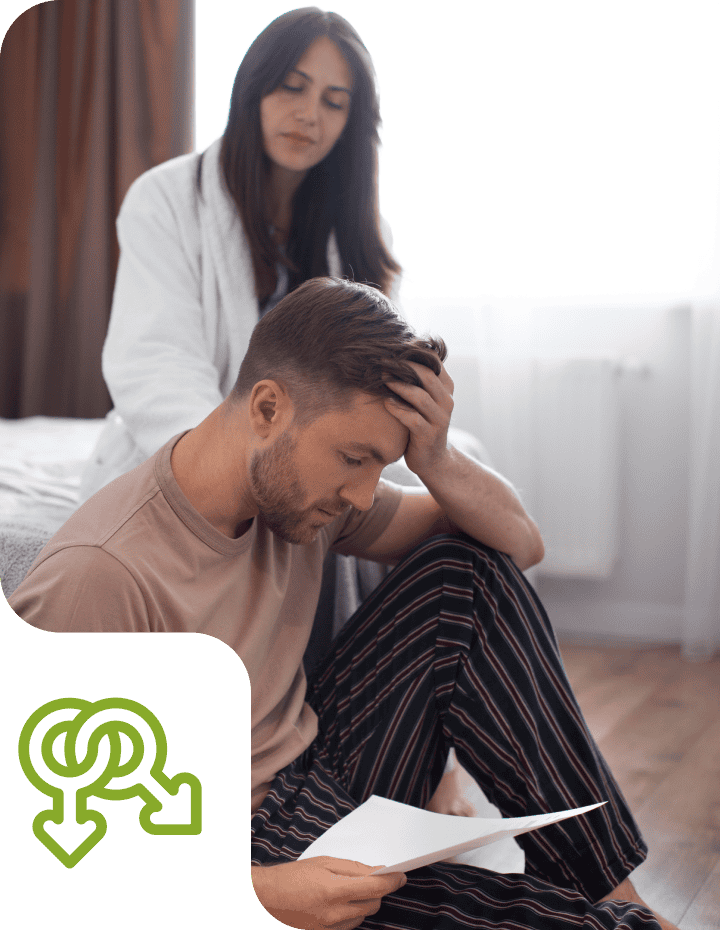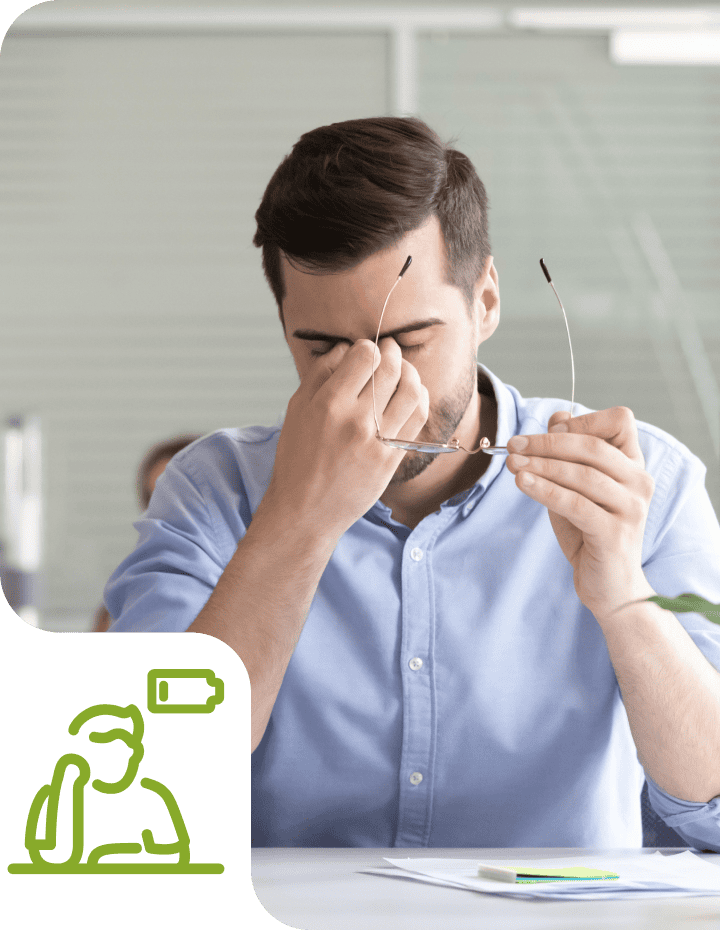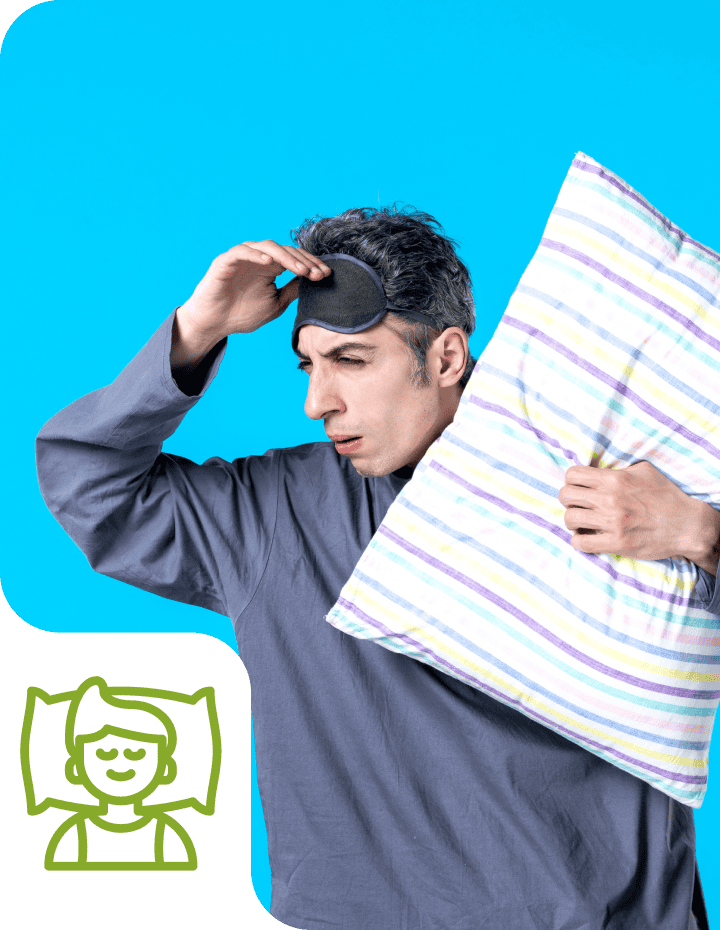
TRT - Testosterone Replacement Therapy
Aging is inevitable, and for many, it signals the beginning of a new chapter - one where you cross off bucket list items and live life to the fullest, on your own terms. However, for some men, aging is a horrible prospect, filled with chronic fatigue, irritability, and inability to perform in the bedroom. If you're concerned about life in middle age and beyond, we've got great news: there are easy, proven steps that you can take to help stop the negative effect of aging.
Global Life Rejuvenation was founded to give men a new lease on life - one that includes less body fat, fewer mood swings, and more energy as you age. If you're ready to look and feel younger, it's time to consider TRT (testosterone replacement therapy), and growth hormone peptides. These therapies for men are effective, safe, and customized to fit your goals, so you can keep loving life as you get older.
TRT, and growth hormone peptide therapies bridge the gap between your old life and the more vibrant, happier version of you. With a simple click or call, you can be well on your way to a brighter future. After all, you deserve to be the one in charge of your wellness and health. Now, you have the tools to do so - backed by science and applied by our team of TRT and HRT experts with more than 13 years of experience.

- Unlock A More Youthful You With Testosterone Replacement Therapy In Bergenfield, NJ
- TRT and Anti-Aging Medicine for Men
- Common Symptoms of Low Testosterone
- Benefits of TRT and Anti-Aging Medicine for Men
- Fight Back Against Male Menopause
- Reverse Aging with Growth Hormone Peptides in Bergenfield, NJ
- Your New, Youthful Lease on Life Starts Here
 Have A Question?866-797-1140
Have A Question?866-797-1140
Testosteronal Hormone Level

TRT and Anti-Aging Medicine for Men in Maplewood, NJ
For men, getting older comes with its perks, like living life on their own terms and not having to "sweat the small stuff" day in and day out. At the same time, there are aspects of aging that men dread, like hormonal changes. Yes, you read that right - men, not just women, go through hormonal changes as they age. For men, the biggest change involves a drop in testosterone.
Lower levels of testosterone can wreak havoc on a male's mind and body and when left untreated, can result in symptoms like:
- Erectile Dysfunction
- Depression
- Irritability
- Low Sex Drive
- Hair Loss
- Less Muscle Mass
- Problems Concentrating
Those symptoms are concerning, but with testosterone replacement therapy and anti-aging medicine, many males improve their quality of life with age. The good news is that TRT and anti-aging meds aren't only reserved for "old guys." In fact, there's no magic age at which men should start thinking about hormone replacement therapy. Everyone's body is different, so if you're experiencing the above conditions in your mid-30s, TRT could be a viable solution when you consult with a doctor.

Testosterone is a crucial hormone for men and plays an important role throughout the male lifespan. Most of a male's testosterone is produced through the testicles. Also called the male sex hormone, testosterone starts playing its part during puberty.
When a male goes through puberty, testosterone helps males develop:
- Facial Hair
- Body Hair
- Deeper Voice
- Muscle Strength
- Increased Libido
- Muscle Density
As boys turn to men and men grow older, testosterone levels deplete naturally. Sometimes, events like injuries and chronic health conditions like diabetes can lower testosterone levels. Unfortunately, when a man loses too much T, it results in hypogonadism. When this happens, the testosterone must be replaced, or the male will suffer from symptoms like muscle loss, low libido, and even depression.

TRT is exactly what it sounds like: a treatment option for men that replaces testosterone so that your body regulates hormones properly and restores balance to your life. Also called androgen replacement therapy, TRT alleviates the symptoms that men experience with low T.
Originally lab-synthesized in 1935, testosterone has grown in popularity since it was produced. Today, TRT and other testosterone treatments are among the most popular prescriptions in the U.S.
Without getting too deep into the science, TRT works by giving your body the essential testosterone it needs to function correctly. As the primary androgen for both males and females, testosterone impacts many of the body's natural processes - especially those needed for overall health. For example, men with low T are more prone to serious problems like cardiovascular disease and even type-2 diabetes.
When your body quits making enough testosterone, it causes your health to suffer until a solution is presented. That's where TRT and anti-aging medicine for men can help. TRT helps balance your hormones and replenish your depleted testosterone. With time, your body will begin to heal, and many symptoms like low libido and irritability begin to diminish.

For men, aging is the biggest contributor to lower testosterone levels, though there are other causes like obesity, drug abuse, testicular injuries, and certain prescribed medications. Sometimes, long-term health conditions like AIDS, cirrhosis of the liver, and kidney disease can lower testosterone levels.
When a man's testosterone levels drop significantly, it alters his body's ratio of estrogen and testosterone. Lower testosterone levels cause more abdominal fat, which in turn results in increased aromatase, which converts even more testosterone into estrogen.
If you're concerned that you might have low T, you're not alone. Millions of men in the U.S. feel the same way. The best way to find out if your testosterone is low is to get your levels tested.
For sustainable testosterone replacement therapy benefits, you must consult with hormone doctors and experts like those you can find at Global Life Rejuvenation. That way, you can find the root cause of your hormone problems, and our team can craft a personalized HRT plan tailored to your needs.
Common Symptoms of Low Testosterone
Are you used to blasting through a productive day and accomplishing all your daily goals? Do you find yourself losing muscle mass and the craving to be intimate with your partner? Does your partner complain about how irritable you have become? If you're not usually a curmudgeon, your body could be giving you a sign. It could be time to speak with a doctor about TRT and anti-aging medicine for men in Bergenfield, NJ.
If you're experiencing any of the following symptoms, you might be battling against low testosterone:
One of the most common reasons that men choose TRT is because they have lost that "spark" with their partner. It's not easy for a man to hear that they're not performing like they used to.
Intimacy is a powerful part of any relationship. When a once-healthy sex life dwindles, it can cause serious relationship issues.
The good news is that low libido doesn't have to be a permanent problem. TRT and anti-aging medicines help revert hormone levels back into their normal range. When this happens, many men have a more enjoyable life full of intimacy and sex drive.

Weak erections - it's an uncomfortable subject for many men in the U.S. to talk about. It's even worse to experience first-hand. You're in the midst of an intimate moment, and you can't do your part. Despite being perfectly normal, many men put blame and shame upon themselves when they can't achieve an erection. And while the inability to perform sexually can be caused by poor diet, obesity, and chronic health conditions, low testosterone is often a contributing factor.
Fortunately, weak erections are a treatable condition. The best way to regain your confidence and ability in bed is to speak with your doctor. Once any underlying conditions are discovered, options like TRT may be the best course of treatment.

Do you find it harder and harder to work out and lift weights in the gym? Are you having problems lifting heavy items that you once had no problem lifting?
Recent studies show that when men are inactive, they lose .5% of muscle strength every year, from ages 25 to 60. After 60, muscle loss doubles every decade. While some muscle loss is common as men age, a significant portion can be tied to low testosterone levels. When a man's T levels drop, so does his muscle mass.
Testosterone is a much-needed component used in gaining and retaining muscle mass. That's why many doctors prescribe TRT Maplewood, NJ, for men having problems with strength. One recent study found that men who increased their testosterone levels using TRT gained as much as 2.5 pounds of muscle mass.
Whether your gym performance is lacking, or you can't lift heavy items like you used to, don't blame it all on age. You could be suffering from hypogonadism.

If you're like millions of other men in their late 20s and 30s, dealing with hair loss is a reality you don't want to face. Closely related to testosterone decline and hormone imbalances, hair loss is distressing for many men. This common symptom is often related to a derivative of testosterone called DHT. Excess amounts of DHT cause hair follicles to halt their production, causing follicles to die.
Because hair located at the front and crown is more sensitive to DHT, it grows slower than other follicles and eventually stops growing permanently. Thankfully, TRT and anti-aging treatments for men in Maplewood, NJ, is now available to address hair loss for good.
While it's true that you can't change your genes, you can change the effects of low testosterone on your body. Whether you're suffering from thinning hair or hair loss across your entire head, TRT and other hormone therapies can stop hair loss and even reverse the process.

Also called "man boobs," gynecomastia is essentially the enlargement of male breast tissue. This increase in fatty tissue is often caused by hormonal imbalances and an increase in estrogen. For men, estrogen levels are elevated during andropause. Also called male menopause, andropause usually happens because of a lack of testosterone.
If you're a man between the ages of 40 and 55, and you're embarrassed by having large breasts, don't lose hope. TRT is a safe, effective way to eliminate the underlying cause of gynecomastia without invasive surgery. With a custom HRT and fitness program, you can bring your testosterone and estrogen levels back to normal before you know it.

Decreased energy was once considered a normal part of aging. Today, many doctors know better. Advances in technology and our understanding of testosterone show that low T and lack of energy often go hand-in-hand.
If you're struggling to enjoy activities like playing with your kids or hiking in a park due to lack of energy, it could be a sign of low T. Of course, getting tired is perfectly normal for any man. But if you're suffering from continual fatigue, a lack of enjoyment, or a decrease in energy, it might be time to speak with a doctor.
Whether you're having a tough time getting through your day or can't finish activities you used to love, TRT could help.

A study from 2011 showed that men who lose a week's worth of sleep can experience lowered testosterone levels - as much as 15%, according to experts. Additional research into the topic found almost 15% of workers only get five hours of sleep (or less) per night. These findings suggest that sleep loss negatively impacts T levels and wellbeing.
The bottom line is that men who have trouble sleeping often suffer from lower testosterone levels as a result. If you find yourself exhausted at the end of the day but toss and turn all night long, you might have low T.
TRT and anti-aging medicines can restore your T levels back to normal, which can help you sleep better with proper diet and exercise.

You're feeling down about everything, and there's no solid explanation for why you're in such a crummy mood. Your daily life is great and full of success, but you can't help but feel unexcited and unmotivated. If you're experiencing symptoms like these, you may be depressed - and it may stem from low testosterone.
A research study from Munich found that men with depression also commonly had low testosterone levels. This same study also found that depressed men had cortisol levels that were 67% higher than other men. Because higher cortisol levels lead to lower levels of testosterone, the chances of severe depression increase.
Depression is a very real disorder and should always be diagnosed and treated by your doctor. One treatment option gaining in popularity is TRT for depression. Studies show that when TRT is used to restore hormone levels, men enjoy a lighter, more improved mood. That's great news for men who are depressed and have not had success with other treatments like anti-depression medicines, which alter the brain's chemistry.

Ask anyone over the age of 50 how their memory is, and they'll tell you it wasn't what it used to be. Memory loss and lack of concentration occur naturally as we age - these aren't always signs of dementia or Alzheimer's.
However, what many men consider a symptom of age may be caused by low testosterone. A 2006 study found that males with low T levels performed poorly on cognitive skill tests. These results suggest that low testosterone may play a part in reducing cognitive ability. If you're having trouble staying on task or remembering what your schedule is for the day, it might not be due to your age. It might be because your testosterone levels are too low. If you're having trouble concentrating or remembering daily tasks, it could be time to talk to your doctor.
Why? The aforementioned study found that participating men experienced improved cognitive skills when using TRT.

Even though today's society is more inclusive of large people, few adults enjoy gaining weight as they age. Despite their best efforts, many men just can't shed the extra pounds around their midsections, increasing their risk of heart disease and cancer.
Often, male weight gain is caused by hormone imbalances that slow the metabolism and cause weight to pile on. This phase of life is called andropause and happens when there is a lack of testosterone in the body. Couple that with high cortisol levels, and you've got a recipe for flabby guts and double chins.
Fortunately, TRT treatments and physician-led weight loss programs can correct hormone imbalances and lead to healthy weight loss for men.












Benefits of TRT and Anti-Aging Medicine for Men in Englewood, NJ
The benefits of hormone replacement therapy for men are numerous. TRT not only grants relief from low-T symptoms but can help give protection against age-related diseases. Additionally, doctors now recognize male testosterone as an important role in alleviating depression.
Some of the most exciting benefits of TRT can include:
- Reduction in Body Fat
- Increased Strength
- More Muscle Mass
- More Energy
- Lower Risk of Erectile Dysfunction
- Higher Sperm Production
- Healthy Reproductive Tissues
- Lower Risk of Heart Disease and Diabetes
- Lower Risk of Anxiety
- Lower Risk of Depression
Fight Back Against Male Menopause
Because men do not go through a specific period of hormonal changes like women do (called menopause), many doctors refer to "male menopause" as androgen decline. This is just another term for low testosterone, but like female menopause, the symptoms can be serious and affect your quality of life.
The best way to fight back against male menopause is with male HRT treatment from Global Life Rejuvenation. We provide the following HRT treatments for men:
- Testosterone Replacement Therapy (TRT)
- Sermorelin (Sermorelin Acetate)
- Human Growth Hormone (HGH)
Our treatment options are personalized for your body and are available as creams, gels, injectables, and implantable pellets. To find out if testosterone replacement therapy is safe for you, contact Global Life Rejuvenation today to schedule your comprehensive testing and anti-aging treatment consultation.

Reverse Aging with Growth Hormone Peptides in Maplewood, NJ
Growth hormone peptides are an innovative therapy that boosts the natural human growth hormone production in a person's body. These exciting treatment options help slow down the aging process and give you a chance at restoring your youth.

Sermorelin is a synthetic hormone peptide, like GHRH, which triggers the release of growth hormones. When used under the care of a qualified physician, Sermorelin can help you lose weight, increase your energy levels, and help you feel much younger.

Sermorelin is a synthetic hormone peptide, like GHRH, which triggers the release of growth hormones. When used under the care of a qualified physician, Sermorelin can help you lose weight, increase your energy levels, and help you feel much younger.
Benefits of Sermorelin include:
- Better Immune Function
- Improved Physical Performance
- More Growth Hormone Production
- Less Body Fat
- Build More Lean Muscle
- Better Sleep
Your New, Youthful Lease on Life Starts Here
Whether you are considering our TRT services, HRT for women, or our growth hormone peptide services, we are here to help. The first step to turning back the hand of time starts by contacting Global Life Rejuvenation.
Our friendly, knowledgeable TRT and HRT experts can help answer your questions and walk you through our procedures. From there, we'll figure out which treatments are right for you. Before you know it, you'll be well on your way to looking and feeling better than you have in years!
Request a Consultation

Latest News in Maplewood, NJ
Light Snow Flurries Expected In SOMA Area: Local Weather Forecast
Eric Kieferhttps://patch.com/new-jersey/maplewood/light-snow-flurries-expected-soma-area-local-weather-forecast
MAPLEWOOD, NJ — A state of emergency has been declared in South Jersey ahead of a winter storm on Monday, but Maplewood, South Orange and the rest of North Jersey is only expected to get a light flurry, weather forecasters say.The latest forecast from the National Weather Service (NWS) has the southernmost tip of the state seeing between 8 and 12 inches of snow. Gov. Phil Murphy has called for a ...
MAPLEWOOD, NJ — A state of emergency has been declared in South Jersey ahead of a winter storm on Monday, but Maplewood, South Orange and the rest of North Jersey is only expected to get a light flurry, weather forecasters say.
The latest forecast from the National Weather Service (NWS) has the southernmost tip of the state seeing between 8 and 12 inches of snow. Gov. Phil Murphy has called for a state of emergency in Atlantic, Burlington, Camden, Cape May, Cumberland, Gloucester and Salem counties. Read More: See The Latest Snow Forecast For NJ
Weather forecasters are predicting a much lighter snowfall for the northern part of the state, however – with less than an inch of snow accumulation expected Monday in Maplewood and South Orange. Sunny skies are expected later in the week.
Here is this week’s forecast for Maplewood and South Orange from the NWS:
Monday: Light snow, mainly before 2pm. High near 31. Wind chill values between 25 and 30. Calm wind becoming north around 6 mph in the afternoon. Chance of precipitation is 80%. Total daytime snow accumulation of less than one inch possible.
Find out what's happening in Maplewoodfor free with the latest updates from Patch.
Monday Night: Mostly cloudy, then gradually becoming mostly clear, with a low around 19. Wind chill values between 5 and 15. Northwest wind 6 to 14 mph, with gusts as high as 24 mph.
Tuesday: Sunny, with a high near 30. Wind chill values between 5 and 15. Blustery, with a northwest wind 13 to 20 mph, with gusts as high as 40 mph.
Tuesday Night: Mostly clear, with a low around 21. Wind chill values between 10 and 15. Northwest wind 13 to 16 mph, with gusts as high as 30 mph.
Wednesday: Sunny, with a high near 28. Northwest wind 14 to 17 mph, with gusts as high as 32 mph.
Wednesday Night: Mostly clear, with a low around 17.
Thursday: Mostly sunny, with a high near 29. Blustery.
Thursday Night: Mostly clear, with a low around 23.
Friday: Sunny, with a high near 36.
Friday Night: Mostly cloudy, with a low around 24.
Send local news tips and correction requests to [email protected]. Learn more about advertising on Patch here. Find out how to post announcements or events to your local Patch site.
Disclaimer:

Service Areas

 WITH OVER 13 YEARS OF EXPERIENCE
WITH OVER 13 YEARS OF EXPERIENCE
